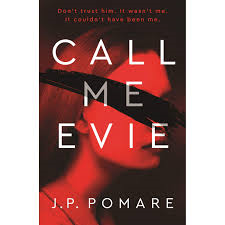If you are lucky, your summer holidays include great stretches of time when you can indulge your reading addiction in a stress-free environment, and I suspect that the reason so many of us reach for crime novels at this time is that we can fully immerse ourselves in a page-turning thriller without fear of interruption. One of this summer’s literary psychological mysteries is the debut novel by J.P. Pomare Call Me Evie (Hachette Australia Books 2018), and it will grab your attention and keep you guessing until the final pages.
The novel’s structure seesaws between ‘Before’ and ‘After’, and although we don’t know the details of the pivotal incident that separates the two, it is clear that a tragedy has occurred. The book is written in first person and opens with adolescent Kate relating an unsettling incident: she is alone in an isolated house with someone who appears to be keeping her captive, and he is cutting off – shaving off – all of her hair. The book then cuts to a memory from ‘Before’, when Kate was a young child and suffered a terrible accident (or was it?), and then we go back and forth from the past to the present. It is clear Kate cannot remember whole chunks of time, and that she has forgotten critical incidents. Who is the man she is with and why is he holding her captive? Is he protecting her and hiding her for her own good, or is he intent on harming her? We become suspicious that Kate (or the girl called Evie) is an unreliable narrator and then everything comes into question. She is paranoid about the locals she does manage to meet, but is her paranoia justified? Is she suffering from some sort of mental health problem? Is she innocent and vulnerable? Is she responsible for a terrible act? The details emerge gradually as the narrative develops, but with each reveal the reader only becomes more confused, and entangled in the complex web of lies woven by various characters. The trick is in working out who is telling the truth, who is concealing the truth, and who is constructing the truth.
Most of the book is set in an isolated spot in New Zealand and the author writes with authority about the landscape and environment there. The setting is claustrophobic yet beautiful, dangerous yet idyllic.
One theme that the book addresses is the modern online world, and the dangers that lie in wait for adolescents who are careless or too trustworthy. Photos, texts, emails and social media – all are snares for the unwary. Without giving any spoilers, it is fair to say that this book delves into both sides of how a situation might develop and unravel and tries out the blame and shame on all concerned to see how it might sit.
Another prominent theme of the book talks around what we would do for those we love or care about, the sacrifices we are prepared to make and how much betrayal we are able to forgive.
There are plenty of red herrings along the way, as well as suspicion attached to the motivations of different characters. At the beginning of the story, we are sympathetic to some characters but this changes as the tale progresses. The twist at the end is worth the wait, and quite unexpected.
The page-turning tension and the fast-paced plot are consuming but this is also a well-written, literary story. Whether she is victim or villain, we are invested in Kate’s situation and we care about what happens to her.

